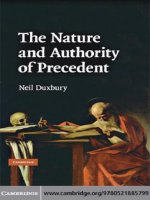0521845319 cambridge university press international conflict and security law essays in memory of hilaire mccoubrey jul 2005
Bạn đang xem bản rút gọn của tài liệu. Xem và tải ngay bản đầy đủ của tài liệu tại đây (2.65 MB, 350 trang )
This page intentionally left blank
INTERNATIONAL CONFLICT
AND SECURITY LAW
Hilaire McCoubrey wrote extensively in the area of armed conflict law
(governing the use of force in international relations, and the conduct of
hostilities), and on the issues of collective security law and the law relating to
arms control. Although he died at the early age of forty-six in 2000 he had
contributed significantly to the separate study of these areas, but also to the
idea of studying the issues as a whole subject. The collection covers difficult
and controversial issues in the area of conflict and security law. Within a
coherent framework provided by extracts from Hilaire’s own work, the
contributors, drawn both from academe and practice, provide expert
analysis of many aspects of the law governing armed conflict and collective
security. These include the application of international humanitarian law in
the operational context; the duty to educate in humanitarian law; superior
orders; command responsibility; the protective emblem; the relevance of
international humanitarian law to terrorism; and legitimate military targets.
The book then moves from a consideration of the laws of war to the law of
peace with a consideration of the application of human rights law in
international armed conflict law. An essay on democracy as an aspect of
peace and security widens the human rights debate out further and takes us
into regional security regimes. The essays then move on to discuss aspects of
collective security law. As well as providing a fitting tribute to the main
aspects of Hilaire’s contribution to knowledge, the volume provides a
coherent reconsideration and development of key aspects of conflict and
security law at a time when that law is being applied, breached, debated or
reformed on almost a daily basis.
R I C H A R D B U R C H I L L is Director of the McCoubrey Centre for
International Law. His research concerns the development of democracy
in international law. He is author of The European Union and the
Promotion and Protection of Democracy in International Law (2005).
N I G E L D . W H I T E is Professor of International Organisations at the
University of Nottingham. He is the editor of Collective Security Law
(2002), and co-editor of the Journal of Conflict and Security Law.
J U S T I N M O R R I S is Senior Lecturer in International Politics at the
University of Hull. He is co-author (with the late Professor Hilaire
McCoubrey) of Regional Peacekeeping in the Post-Cold War Era (2000).
INTERNATIONAL CONFLICT
A N D S E C U RI T Y L A W
Essays in Memory of Hilaire McCoubrey
Edited by
RICHARD BURCHILL, NIGEL D. WHITE
AND JUSTIN MORRIS
Published in association with the McCoubrey Centre
for International Law
cambridge university press
Cambridge, New York, Melbourne, Madrid, Cape Town, Singapore, São Paulo
Cambridge University Press
The Edinburgh Building, Cambridge cb2 2ru, UK
Published in the United States of America by Cambridge University Press, New York
www.cambridge.org
Information on this title: www.cambridge.org/9780521845311
© Cambridge University Press 2005
This publication is in copyright. Subject to statutory exception and to the provision of
relevant collective licensing agreements, no reproduction of any part may take place
without the written permission of Cambridge University Press.
First published in print format 2005
isbn-13
isbn-10
978-0-511-12546-1 eBook (EBL)
0-511-12546-1 eBook (EBL)
isbn-13
isbn-10
978-0-521-84531-1 hardback
0-521-84531-9 hardback
Cambridge University Press has no responsibility for the persistence or accuracy of urls
for external or third-party internet websites referred to in this publication, and does not
guarantee that any content on such websites is, or will remain, accurate or appropriate.
CONTENTS
Biography of Hilaire McCoubrey
Notes on contributors
page
ix
xi
Foreword: There are men too gentle to live among wolves
xvi
Gary Edles
List of abbreviations
xix
1
Hilaire McCoubrey and international conflict
and security law
1
Nigel D. White
2
The development of operational law within Army
Legal Services
21
Gordon Risius
3
Reflections on the relationship between the duty to
educate in humanitarian law and the absence of a defence of
mistake of law in the Rome Statute of the International
Criminal Court
32
Neil Boister
4
Superior orders and the International Criminal Court
Robert Cryer
5
Command responsibility: victors’ justice or just
desserts?
68
Colonel C. H. B. Garraway
6
The proposed new neutral protective emblem: a long-term
solution to a long-standing problem
84
Michael Meyer
v
49
vi
CONTENTS
7
Towards the unification of international humanitarian
law?
108
Lindsay Moir
8
Of vanishing points and paradoxes: terrorism and international
humanitarian law
129
Richard Barnes
9
What is a legitimate military target?
A. P. V. Rogers
160
10
The application of the European Convention on Human Rights
during an international armed conflict
185
Peter Rowe
11
Regional organizations and the promotion and protection of
democracy as a contribution to international peace and
security
209
Richard Burchill
12
Self-defence, Security Council authority and Iraq
Nigel D. White
13
International law and the suppression of maritime
violence
265
Scott Davidson
14
Law, power and force in an unbalanced world
Justin Morris
Bibliography of Hilaire McCoubrey’s work
Index
317
235
286
314
BIOGRAPHY
The Reverend Professor Hilaire McCoubrey 1953–2000
Hilaire was educated at Hymers College, Hull (1962–8) and Portsmouth
Grammar School (1968–72). He studied for a law degree at Trinity
College Cambridge (1972–5), and qualified as a solicitor in 1978 after
serving his articles with the Greater London Council. He was appointed
by Professor Sir John Smith to a lectureship in the Law Department at
the University of Nottingham in 1978, and was promoted to a Senior
Lectureship in 1991. He taught mainly Public International Law, Legal
Theory and Planning Law while at Nottingham and wrote extensively in
these areas, as shown by the bibliography of his work. His specialization
in conflict and security law, evidenced by his seminal book International
Humanitarian Law published in 1990, led him to establish the Centre for
International Defence Law Studies in 1991. Its chief publication – The
International Law and Armed Conflict Commentary – became the Journal
of Armed Conflict Law in 1996 published by Nottingham University
Press, and then the Journal of Conflict and Security Law published by
Oxford University Press from 2000. While at Nottingham he completed
a Ph.D in 1990, the thesis being published as The Obligation to Obey in
Legal Theory. Between 1992 and 1995 Hilaire studied part-time for a
Diploma of Theological and Pastoral Studies and was ordained as a
deacon in the Church of England in 1995. He became a non-stipendiary
minister in the Parish of Rowley and Skidby after moving to Beverley,
Yorkshire. This was after his appointment to a Chair at the University of
Hull in 1995 where he also became Director of Postgraduate Studies in
the Law School. He relocated the Centre for International Defence Law
Studies to Hull and continued to produce numerous books and articles
on humanitarian law and more widely on collective security issues, as
well as significantly expanding the postgraduate curriculum in Public
International Law at Hull. He was a member of numerous bodies and
organizations, playing an active role in the British Red Cross, the
ix
x
BIOGRAPHY OF HILAIRE MCCOUBREY
International Committee of the Red Cross, the British Institute for
International and Comparative Law, the International Law
Association, the Political Studies Association, the San Remo Institute
of International Humanitarian Law and the International Society for
Military Law; and was invited to give lectures and papers around the
globe. It was on a lecturing visit to Pakistan in April 2000 that he died at
the age of forty-six.
McCoubrey Centre for International Law
Following Hilaire’s death the University of Hull Law School felt it would
be appropriate to create a Centre that would carry on his work in
international law and relations. The Centre was instituted in 2001 with
the goal of promoting the study and research of international law and
relations. The Centre hosts a number of guest speakers through its
International Law Seminar Series and the Hilaire McCoubrey
Memorial Lecture. Further information about the Centre and its activities may be found at www.hull.ac.uk/law/research/intlaw.html
CONTRIBUTORS
Dr Richard Barnes is currently the Sir Q. W. Lee and Dr Peter Thompson
Lecturer in Maritime Law at the University of Hull, where he taught
Public International Law and Law of the Sea with Hilaire McCoubrey.
He is currently researching in the areas of shipping and security and
maritime resource use and his publications include ‘Refugee Law at Sea’,
(2004) 53(1) International and Comparative Law Quarterly 47 and
‘Barecon 2001: The Barecon 89 Bareboat Charter Revised’, (2002) 4
Lloyds Maritime and Commercial Law Quarterly 528.
Dr Neil Boister is Senior Lecturer at the School of Law, University of
Canterbury, New Zealand. He is the editor of two volumes of the South
African Yearbook of Human Rights and author of Penal Aspects of the UN
Drug Conventions (Kluwer Law International, 2001). He has delivered
numerous papers on aspects of criminal, international and transnational
criminal law and is the author of numerous articles in refereed journals
including most recently ‘Transnational Criminal Law?’, (2003) 14(5)
European Journal of International Law 953 and ‘The Trend to ‘‘Universal
Extradition’’ over Subsidiary Universal Jurisdiction in the Suppression
of Transnational Crime’, [2003] Acta Juridica 287. He has been a
Contributing Editor to the South African Journal of Criminal Justice
(Jutas, CTO), and is a member of the founding editorial team of the
New Zealand Yearbook of International Law.
Dr Richard Burchill is Director of the McCoubrey Centre of
International Law, University of Hull. His research focuses on the role
of international organizations in the promotion and protection of
democracy in international law. His publications include The
European Union, International Law and the Promotion and Protection
of Democracy (Hart Publishing, 2005); ‘The European Union and
European Democracy: Social Democracy or Democracy with a Social
Dimension?’, (2004) 17(1) Canadian Journal of Law and Jurisprudence
185; ‘The Role of Democracy in the Protection of Human Rights:
Lessons from the European and Inter-American Human Rights
xi
xii
NOTES ON CONTRIBUTORS
Systems’, in David Forsythe and Patrice McMahaon (eds.), Human
Rights and Diversity: Area Studies Revisited (University of Nebraska
Press, 2003), pp. 137–56.
Dr Robert Cryer is Lecturer in Law at the University of Nottingham,
where he teaches criminal law and international law, including international legal theory, international criminal law and the law of collective
security. He has published mainly in the area of international law, in
particular international criminal law, the law of armed conflict and
international legal theory. His publications include Prosecuting
International Crimes (Cambridge University Press, 2005); ‘General
Principles of Liability in International Criminal Law’, in Dominic
McGoldrick, Peter Rowe and Eric Donnelly (eds.), The International
Criminal Court: Legal and Policy Issues (Hart Publishing, 2004),
pp. 233–86; ‘Implementation of the International Criminal Court
Statute in England and Wales’, (2002) 51 International and
Comparative Law 733; and ‘The Fine Art of Friendship: Jus in Bello in
Afghanistan’, (2002) 7 Journal of Conflict and Security Law 37.
Scott Davidson is Professor of International Law, Pro Vice Chancellor
and Dean of the Law School at the University of Canterbury, New
Zealand. He has been an occasional consultant to the New Zealand
Ministry of Foreign Affairs and Trade and a number of law firms. He
represents New Zealand on the Maritime Cooperation Working Group
of the Council for Security and Cooperation in Asia Pacific and is a
member of the editorial and advisory boards of the International Journal
of Marine and Coastal Law, the New Zealand Yearbook of International
Law and the New Zealand Journal of Public and International Law.
Publications include Contemporary Issues in International Law: A
Collection of the Josephine Onoh Memorial Lectures edited with David
Freestone and Surya Subedi (Kluwer, 2002); New Zealand Handbook on
International Human Rights (Ministry of Foreign Affairs and Trade,
1998).
Gary J. Edles is a Visiting Professor at the University of Hull Law
School and a Fellow in Administrative Law and Adjunct Professor of
Law at American University Washington College of Law, Washington,
DC. A retired career civil servant, he is co-author of Federal Regulatory
Process: Agency Practices and Procedures (Prentice Hall, 1987, revised
1997).
Colonel Charles Garraway, CBE, retired in 2003 after thirty years in
Army Legal Services. He is now a Senior Research Fellow at the British
Institute of International and Comparative Law and a Visiting Professor in
NOTES ON CONTRIBUTORS
xiii
Law at King’s College, London. He is due to take up the Stockton Chair in
International Law at the United States Naval War College in August 2004.
His publications include contributions to Roy Lee (ed.), The International
Criminal Court: Elements of Crimes and Rules of Procedure and Evidence
(Kluwer Law International, 1999), as well as a number of articles on
international criminal law and the law of armed conflict.
Michael Meyer is the Head of the International Law Department at
the British Red Cross. He is a member of the Council of the International
Institute of Humanitarian Law in San Remo, Italy, and a member of the
UK Group of the International Society for Military Law and the Law of
War. His publications include Reflections on Law and Armed Conflicts,
co-edited with Hilaire McCoubrey (Kluwer, 1998); ‘The Relationship
between the Red Cross and the Armed Forces: A Partnership for
Humanitarian Purposes’, in Liesbeth Lijnzaad et al. (eds.), Making the
Voice of Humanity Heard (Martinus Nijhoff, 2004), and ‘The Role of the
International Red Cross and Red Crescent Movement: Problems
Encountered’, in Peter Rowe (ed.), The Gulf War 1990–91 in
International and English Law (Routledge, 1993).
Justin Morris is Senior Lecturer in International Politics and Deputy
Dean in the Faculty of Arts and Social Sciences at the Department of
Politics and International Studies, University of Hull. From 1997 to
2003 he was Secretary of the British International Studies Association.
He was co-author (with Hilaire McCoubrey) of Regional Peacekeeping in
the Post-Cold War Era (Kluwer, 2000), and has written articles and book
chapters on Security Council reform, humanitarian intervention and
the role of international law in international relations. He is currently
working on a book on Security Council reform.
Gordon Risius is a circuit judge, currently on temporary secondment
to the Immigration Appeal Tribunal as a Vice President. A solicitor by
training, he was commissioned into the Army as a legal officer in 1973
and served for thirty years, the last six as Director of Army Legal Services
in the rank of major general. Until his retirement from the Army in
January 2003 he was a Vice President of the International Society for
Military Law and the Law of War as well as an instructor at the
International Institute of Humanitarian Law in San Remo, Italy. His
publications include ‘Prisoners of War in the United Kingdom’, in Peter
Rowe (ed.), The Gulf War 1990–91 in International and English Law
(Routledge, 1993), pp. 289–303 and ‘The Protection of Prisoners of War
Against Insults and Public Curiosity’, (1993) 295 International Review of
the Red Cross 298, with Michael Meyer.
xiv
NOTES ON CONTRIBUTORS
Peter Rowe is Professor of Law and Head of the Law School, Lancaster
University. He has published widely on international humanitarian law
and military law. He is the editor with Dominic McGoldrick and Eric
Donnelly of The International Criminal Court: Legal and Policy Issues
(Hart Publishing, 2004); International Humanitarian Law: A Guide to
Action (British Red Cross and Foreign and Commonwealth Office,
2003) with Michael Meyer and The Gulf War 1990–91 in International
and English Law (Routledge, 1993), and his publications include
‘Responses to Terror: The New ‘‘War’’, (2002) 3 Melbourne Journal of
International Law 301 and ‘A New Court to Protect Human Rights in the
Armed Forces of the UK: The Summary Appeal Court’, (2003) 8 Journal
of Conflict and Security Law 201.
Dr Lindsay Moir is a Senior Lecturer in Law at the University of Hull,
and a member of the McCoubrey Centre for International Law. He is the
author of The Law of Internal Armed Conflict (Cambridge University
Press, 2002) along with several articles on humanitarian law and human
rights, including ‘Law and the Inter-American Human Rights System’,
(2003) 25 Human Rights Quarterly 182 and ‘The Implementation and
Enforcement of the Laws of Non-International Armed Conflict’, (1998)
3(2) Journal of Armed Conflict Law 163.
A. P. V. Rogers is Yorke Distinguished Visiting Fellow of the Faculty
of Law and Fellow of the Lauterpacht Research Centre for International
Law, University of Cambridge; formerly Director of Army Legal
Services; author of the prize-winning book, Law on the Battlefield (2nd
edn, Manchester University Press, 2004).
Dr Nigel White is Professor of International Organisations in the
School of Law at the University of Nottingham. His publications include
Keeping the Peace: The United Nations and the Maintenance of
International Peace and Security (Manchester University Press, 1997);
The UN System: Toward International Justice (Lynne Rienner, 2002) and
The Law of International Organisations (Manchester University Press,
1996). He edited a collection of essays on Collective Security Law
(Ashgate, 2003). He was co-author of three books on international law
with Hilaire McCoubrey: International Law and the Use of Force
(Dartmouth, 1992), International Organizations and Civil Wars
(Dartmouth, 1995) and The Blue Helmets: The Legal Regulation of
United Nations Military Operations (Dartmouth, 1996). He has written
numerous articles and essays including a contribution to the American
Society of International Law project on Democratic Accountability and
the Use of Force in International Law, co-edited by Charlotte Ku and
NOTES ON CONTRIBUTORS
xv
Harold Jacobson (Cambridge University Press, 2002). He is co-editor
with Eric Myjer (Utrecht) of the Journal of Conflict and Security Law
published tri-annually by Oxford University Press. The Journal covers
the areas of arms control law, humanitarian law and collective security
law, and endeavours to explore the interfaces between them.
FOREWORD: THERE ARE MEN TOO GENTLE TO
LIVE AMONG WOLVES
GARY EDLES
Hilaire McCoubrey was an expert on the law of armed conflict or the law
of war. Those terms themselves appear to be an oxymoron, and his
relationship to them seems incongruous for such a gentle man. But if
you give the subject its current, more fashionable name – ‘humanitarian
law’ – Hilaire’s association with the subject is thoroughly understandable. His purpose, after all, was to inject humanitarian principles into a
hostile environment. That was both his professional calling and an
essential element of his character. During the brief period of our association, before his untimely death, I came to admire and respect him as a
colleague and genuinely value him as a friend.
Hilaire had exceptional academic achievements and encouraged others
to think and write about the subjects with which he was concerned. Other
commentators in this compendium are better equipped than I to address
these matters. But Hilaire’s character and spirit were equally, if not more,
impressive. He was a full-time academic and an ordained Anglican priest.
He pursued both callings simultaneously with equal devotion. At his death,
he was assistant curate of St Mary’s Church in Beverley.
Hilaire came relatively late to his clerical calling. He studied for the
priesthood after having first established himself as a legal scholar and
teacher at the School of Law at the University of Nottingham and as a
qualified solicitor. His capability as a clergyman was tested almost
immediately upon his ordination. Virtually his first pastoral activity,
which coincided with his appointment to the Law School at Hull in
1995, was to preside over the funeral of Raymond Smith, a distinguished
member of staff and former Dean of the Law School. Despite his being
quite a novice clergyman, Hilaire performed with characteristic kindliness and sensitivity that everyone appreciated.
His first ecclesiastical post, which he held for three years, was as the
assistant curate at Rowley Parish Church. He was once again quickly
tested, and again carried out his duties superbly. When the full-time
vicar left the community, Hilaire took over his responsibility for Rowley
xvi
FOREWORD
xvii
and the neighbouring churches of Skidby and Bentley. Not only did
Hilaire drive from village to village every Sunday morning to take the
service at the various churches, he served fully as spiritual leader of the
communities. He performed marriage services, presided at funerals and
provided pastoral counselling that occupied a considerable portion of
his time. On numerous occasions, despite a long day in the classroom or
otherwise coping with his considerable Law School responsibilities, he
would be awakened during the night because a member of one of his
parishes had died and he was needed to oversee arrangements. He did so
unflinchingly and was always available to his parishioners. It was a fulltime job on top of his full-time job. At all times he served the Church
without remuneration. That was thoroughly in keeping with his personality. Service to his God and his community required no financial
reward.
Hilaire’s unassuming manner camouflaged his eclectic interests and
sophisticated tastes. He played both the piano and organ and was a
member of the Malt Whiskey Society. We both lived in Beverley and on
several occasions I would drive him to the local fish and chip shop so he
could pick up a take-away evening meal. But, when my wife and I were
dinner guests at his home, we had the opportunity to sample his considerable culinary talents. He had a special interest in maritime matters.
On the evening of our visit, we discussed turn-of-the-century shipping
lines and I made a passing reference to the vessel that took my grandparents from Europe to America nearly a century ago. Hilaire took the
time to search his personal archives to find information about, and a
picture of, the ship that transported them. His intellectual interests
ranged far beyond the law and he was both resourceful and unfailingly
helpful.
His cluttered desk belied an extraordinarily sharp mind. I never
attended any of his lectures. But I once attended a service at St Mary’s
at which Hilaire was the officiant. He delivered a thoroughly integrated
and rather poignant thirty-minute homily entirely without notes. As the
Reverend David Hoskin, Vicar of St Mary’s, noted in his eulogy, one of
Hilaire’s great strengths was an ability to render complex or technical
issues understandable to those less familiar with the subject.
Hilaire had a wry and ironic sense of humour. David Hoskin tells a
story about the period when Hilaire was both teaching at Nottingham
and studying for the priesthood. While a student in the ordination
course, Hilaire led an ‘organised truancy from a boring lecture’ to go
to the pictures and for an Indian meal. Totally in character, this event
xviii
FOREWORD
was re-enacted annually thereafter as a reunion for his year group on the
course, according to Revd Hoskin.
James Kavanaugh, the American author and poet, himself a former
priest, penned a poem whose thoughts may capture some of Hilaire’s
special qualities. Kavanaugh wrote:
There are men too gentle to live among wolves
Who prey upon them with IBM eyes
And sell their hearts and guts for martinis at noon.
There are men too gentle for a savage world
Who dream instead of snow and children and Halloween
And wonder if the leaves will change their color soon . . .
There are men too gentle for a corporate world
Who dream instead of candied apples and ferris wheels
And pause to hear the distant whistle of a train . . .
There are men too gentle for an accountant’s world
Who dream instead of Easter eggs and fragrant grass
And search for beauty in the mystery of the sky . . .
James Kavanaugh,
There are Men too Gentle to Live Among Wolves
(Nash Publishing, 1970)
Hilaire McCoubrey was a gentle man whose compassion for the victims
of injustice was not purely academic. He was a Council Member of the
International Red Cross, where he put his compassion into practice. He
now rests in the graveyard outside the church at Rowley, alongside his
father. It is a tranquil and dignified setting that befits this kindly human
being. He was truly a man too gentle to live among wolves. So he devoted
his ample intellect and energy to civilizing the wolves.
ABBREVIATIONS
ALS
CSCAP
ECHR
ECOWAS
ECtHR
EEZ
FRY
HCNM
HQ ARRC
HRA 1998
ICC
ICRC
ICTR
ICTY
IHL
ILC
IMB
IMO
IMT
LOAC
MDA
MPC
NIMA
OAS
OSCE
POW
ROE
SLOC
SOFA
SUA
Army Legal Services
Council for Security Cooperation in Asia Pacific
European Convention on Human Rights
Economic Community of West African States
European Court of Human Rights
exclusive economic zone
Federal Republic of Yugoslavia
High Commission on National Minorities (OSCE)
Allied Command Europe Rapid Reaction Corps
Human Rights Act 1998
International Criminal Court
International Committee of the Red Cross
International Criminal Tribunal for Rwanda
International Criminal Tribunal for the former Yugoslavia
international humanitarian law
International Law Commission
International Maritime Bureau
International Maritime Organisation
International Military Tribunal
law of armed conflict
Magen David Adom
Model Penal Code
US National Imagery and Mapping Agency
Organization of American States
Organization for Security and Cooperation in Europe
prisoner of war
rules of engagement
sea lines of communication
status of forces agreement
Convention for the Suppression of Unlawful Acts
Against the Safety of Navigation 1988
xix
xx
SUAPROT
UNCLOS
UNMOVIC
UNPROFOR
UPD
WMD
LIST OF ABBREVIATIONS
Protocol for the Suppression of Unlawful Acts Against
the Safety of Fixed Platforms Located on the
Continental Shelf 1988
UN Convention on the Law of the Sea
UN Monitoring, Verification and Inspection
Commission
UN Protection Force (Croatia)
Unit for the Promotion of Democracy
weapons of mass destruction
1
Hilaire McCoubrey and international
conflict and security law
NIGEL D. WHITE
Introduction
Hilaire was a prolific writer. Although he died at the early age of forty-six
while on a lecturing visit to Pakistan in April 2000, he had written or
co-written ten books in the areas of international humanitarian law,1
collective security law,2 legal theory3 and even planning law.4 His output
in terms of journal publications was similarly impressive with, for
example, seminal articles in the International and Comparative Law
Quarterly,5 La Revue de Droit Militaire et de Droit de la Guerre,6 the
International Review of the Red Cross,7 International Relations,8
1
2
3
4
5
6
7
8
H. McCoubrey, International Humanitarian Law: The Regulation of Armed Conflicts (1st
edn, Dartmouth, 1990); M. A. Meyer and H. McCoubrey (eds.), Reflections on Law and
Armed Conflicts: Selected Works on the Laws of War by the Late Professor Colonel G. I. A. D
Draper, OBE (Kluwer, 1998).
H. McCoubrey and N. D. White, International Organizations and Civil Wars
(Dartmouth, 1995); H. McCoubrey and N. D. White, The Blue Helmets: Legal
Regulation of United Nations Military Operations (Dartmouth, 1996); H. McCoubrey
and J. Morris, Regional Peacekeeping in the Post Cold-War Era (Kluwer, 2000).
H. McCoubrey, The Development of Naturalist Legal Theory (Croom Helm, 1987);
H. McCoubrey and N. D. White, Textbook on Jurisprudence (3rd edn, Blackstone Press,
1999); The Obligation to Obey in Legal Theory (Dartmouth, 1997).
H. McCoubrey, Effective Planning Appeals (BSP Professional, 1988).
H. McCoubrey, ‘From Nuremberg to Rome: Restoring the Defence of Superior Orders’,
(2001) 50 International and Comparative Law Quarterly 386.
H. McCoubrey, ‘The Nature of the Modern Doctrine of Military Necessity’, (1991) 30 La
Revue de Droit Militaire et de Droit de la Guerre 217; H. McCoubrey, ‘Medical Ethics,
Negligence and the Battlefield’, (1995) 34 La Revue de Droit Militaire et de Droit de la
Guerre 103.
H. McCoubrey, ‘Before ‘‘Geneva’’ Law: A British Surgeon in the Crimean War’, (1995)
304 International Review of the Red Cross 69.
N. D. White and H. McCoubrey, ‘International Law and the Use of Force in the Gulf ’,
(1991) 10 International Relations 347; H. McCoubrey, ‘The Armed Conflict in Bosnia
1
2
INTERNATIONAL CONFLICT AND SECURITY LAW
International Peacekeeping,9 the Journal of Armed Conflict Law and its
successor the Journal of Conflict and Security Law.10 Quite often his
calling as a minister in the Church of England was reflected in his
work.11 This, by no means complete, catalogue of Hilaire’s writings is
sufficient to show that he covered the whole spectrum of international
law relating to armed conflict from the pre-conflict stage when the issues
include those of arms control,12 disarmament and conflict prevention,
through the outbreak of armed conflict and discussion of the legality of
resort to force (the jus ad bellum), to the coverage of the conduct of
military operations and the protection of non-combatants by international humanitarian law (the jus in bello). He also covered collective
security mechanisms that are applicable throughout these different
stages.
The jus ad bellum and the jus in bello are terms still deployed by
international lawyers, concerning the law governing the use of force in
international relations and the law governing the conduct of hostilities.
Hilaire’s work covered both areas as well as the wider aspects of collective security and arms control, though he is probably best known for his
work in the jus in bello, or to use its more modern term, international
humanitarian law, with the publication of his leading text International
Humanitarian Law in 1990.13 In her review of the book, Susan Marks
noted that it should serve the essential function of being a ‘companion
volume to the humanitarian treaties’, and thus should secure an ‘appreciative readership’.14 It certainly achieved both of these aims. Hilaire’s
ethical, but at the same time practical, approach to the subject was
reflected in the Preface to the second edition of this book:
9
10
11
12
13
14
and Proposed War Crimes Trials’, (1993) 11 International Relations 411; H. McCoubrey,
‘International Law and National Contingents in UN Forces’, (1994) 12 International
Relations 39; H. McCoubrey, ‘Kosovo, NATO and International Law’, (1999) 14
International Relations 29.
J. Morris and H. McCoubrey, ‘Regional Peacekeeping in the Post Cold-War Era’, (1999)
6 International Peacekeeping 129.
H. McCoubrey, ‘The Concept and Treatment of War Crimes’, (1996) 1 Journal of Armed
Conflict Law 121; H. McCoubrey and J. Morris, ‘International Law, International
Relations and the Development of European Collective Security’, (1999) 4 Journal of
Armed Conflict Law 195; H. McCoubrey, ‘The Protection of Creed and Opinion in the
Laws of Armed Conflict’, (2000) 5 Journal of Conflict and Security Law 135.
Ibid.
For example, F. Hampson and H. McCoubrey, ‘Giving Legal Evidence in Proliferation
Cases’, in J. Dahlitz (ed.), Future Legal Restraints on Arms Proliferation: Arms Control and
Disarmament Law (United Nations, 1996), p. 25.
McCoubrey, International Humanitarian Law, (1st edn).
S. Marks, (1990) 49 Cambridge Law Journal 525 at p. 526.
NIGEL D. WHITE
3
This book seeks to emphasise that international humanitarian law is no
Utopian aspiration – there is nothing ‘Utopian’ about any aspect of war –
but a severely practical prescription which is entirely workable in the
harsh exigencies of warfare. Obedience to it does not impede legitimate
military efficacy, nor does violation gain any real advantage, but merely
gains the perpetrator a deserved reputation for barbarism, to the detriment of its relations with other states.15
Considering the continued prevalence of warfare since the inception of
the United Nations in 1945, it is remarkable that international humanitarian law was, until the advent of the international criminal tribunals in
Yugoslavia and Rwanda in the mid-1990s, treated by mainstream international lawyers as a bit of a backwater. This is reflected in Susan Marks’
review of the first edition of International Humanitarian Law when she
wrote that ‘if it was ever thought to be an esoteric subject of little
contemporary relevance, recent events show that this is unfortunately
not so’.16 Hilaire’s approach to the subject was to focus on the rules and
principles of international humanitarian law and on the education of
those involved in warfare, whether soldiers or politicians, in the law and
its importance. He did not believe for an instant that there was a
contradiction in espousing the necessity of rules embodying basic principles of humanity in a context where the normal peacetime rules against
killing and destruction are basically suspended. The point Hilaire never
tired of making is that war did not signify that any amount of death and
destruction was permitted; it should and could be regulated. This was
the issue he grappled with in his inaugural lecture to mark his appointment to a Chair at the University of Hull in 1996.17
Furthermore, Hilaire always saw the jus ad bellum and the jus in bello
as two halves of a whole subject underpinned by a coherent philosophical framework. In 1992, while colleagues together at Nottingham
University, we published a co-authored work International Law and
Armed Conflict18 which was intended as a textbook to cover the whole
area. Although the work was divided evenly, Hilaire was almost exclusively the inspiration behind, and the writer of, the introductory chapter
that still provides a most insightful explanation of the coherence of the
15
16
17
18
H. McCoubrey, International Humanitarian Law (2nd edn, Dartmouth, 1998), p. vii.
S. Marks, (1990) 49 Cambridge Law Journal 525.
H. McCoubrey, International Laws of Armed Conflict: Practical Prescription or Dangerous
Utopia? (Hull University Press, 1997).
H. McCoubrey and N.D. White, International Law and Armed Conflict (Dartmouth,
1992).









